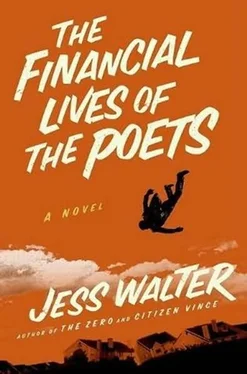“What kind of noise did it make when you hit him? Was it a slapping sound or a thumping sound?”
“Enough, Teddy.”
Another sniffle sniffle from Franklin.
“Elijah Fenton is kind of a jerk, Dad,” Teddy says. “It’s not the worst thing in the world that Frankie hit him.”
“I don’t think that’s true, but even if it were, you know it wouldn’t matter, Teddy,” I say. “It’s never right to hit people.”
Teddy asks, “What if they’re gonna kill your family with a grenade?”
“Elijah Fenton carry a lot of grenades, does he?”
“He probably said something really bad,” Teddy says. “He swears a lot.”
“It doesn’t matter. We don’t solve problems that way. No matter what someone says.”
“What if they say they’re gonna kill your family with a grenade?”
“Let’s stop talking about grenades and think about how Elijah
feels.”
Another moan from Franklin.
“He was playing kickball after school,” Teddy says. “He’s fine. Can’t I just ask what Frankie hit him with? Please. Let me ask that one question and then I’ll be quiet.”
“No.” I’m stuck behind someone turning left; I miss the light. Traffic is hateful.
“Please.”
“No!” I snap, then, realizing I’ve overreacted: “The wooden blocks from music.”
“Clackers! You hit him with clackers. Wow!”
Franklin moans.
“Teddy, that’s enough.”
I pull into the driveway. Inside, Teddy and Franklin retreat to their rooms. I try the Providential Equity prefixes again, leave voicemails all over their phone system. Since Lisa mysteriously claimed to have something to do this evening, I make dinner-chipped beef. Dad comes in from the TV room, sets his remote on the table, wrinkles his brow but doesn’t say a word about what I’ve made. It sits on bread on his plate, covered in white-gray septic gravy.
“Chipped beef, Dad.”
“Gravy looks funny,” he says, but he eats it, fork clacking the plate. The boys herd the food around. Dad gets seconds without a word. We’re a stoic breed-Prior men.
When he’s done, Dad pats his chest for a missing cigarette, then grabs his remote, gives a sigh and marches into the TV room. Plops down in his easy chair. The boys pick at their chipped beef, give me plaintive looks. I give them an extra scoop of ice cream for dessert.
Dark settles in. I help the boys with their homework, avoid
doing dishes, and another night bleeds away (where the hell is she?). I drink a cup of coffee alone at the table (maybe it’s too late…they’ve run off together), check on Dad, who remarks that playing quarterback in a beard would be tough (“Itchy?” I ask), tuck the boys in (have I lost her?) and lean over Franklin in his twin bed, finally ready to have a talk with my little ultimate fighter.
“What did Elijah say that made you so mad?”
“I don’t want to say.”
“Sorry, pal, you have to.”
The covers are at Franklin’s chest; his too-small Shrek pajamas ring his neck. “He called Ms. Bishop a bad word.”
“What word?”
“I don’t want to say it. I’ll get in trouble.”
“I’m giving you a mulligan, Frankie. Bedtime amnesty.”
“What’s that?”
“Means one time you won’t get in trouble for saying it.”
“He said Ms. Bishop was a slut.”
“How do you know that word, Franklin?”
“Elijah always says it.” And then, possibly thinking I don’t know the word, Franklin adds, “It means a girl who kisses lots of people. Elijah says Ms. Bishop kissed his dad, and that his mom called Ms. Bishop a slut. I said she isn’t and he said she is and then…I got real mad. And I hit him.”
But it’s the earlier news that I can’t process. Elijah Fenton’s dad kissed Ms. Bishop? Bullshit. Carl Fenton? No way would that tool have a chance with Ms. Bishop. Not possible. Although…if a tool like Carl Fenton can get in there…
“So you just…hit him?”
“I kept saying she wasn’t a-” he looks at me to see if his amnesty is still in effect…“-slut, that she was nice. Elijah said that I must love her too, and I probably want to kiss her. So I hit him.”
His eyes tear up again. “When he said I liked her, it made me so mad.”
“Maybe…because…you do like her?”
“Da-a-d.” He looks at me like I’m crazy. “Come on. Have you seen her?”
And as much as I empathize with him, this is a lecture I must deliver. The highpoints: (1) Violence is always wrong, except in rare instances of self-defense, or to protect those who can’t protect themselves. (“Like grenades?” Franklin asks, echoing his older brother. “Sure.”) (2) While it was certainly wrong of Elijah to say those things, stacking a wrong on top of his wrong just makes a higher pile of wrong. (3) Next time, Franklin should tell me or tell his teacher, even if it’s embarrassing. (4) It is, however, perfectly natural to have a crush on a teacher. (Especially your teacher, my God, that taut little guitar string…)
Franklin sighs and promises he won’t hit anyone with clackers ever again. (I imagine his next defense: you never told me not to use shakers. ) I kiss his forehead and he grips my arm one more time. “Do people have to sleep even when they’re old?”
“Yeah,” I say. “They do.” More hypocrisy from me: king of the sleepless.
Franklin falls back in bed. The world is so incomprehensible to him, so difficult; he must imagine there is some other world after dark that he can fit into. This is the kid I have to worry about, I suddenly see, the one most likely to land outside a convenience store.
Downstairs I check on my own father, who is staring warily out the dark window, ignoring the television in front of him. He turns to see me in the room, and it takes a second for him to remember who I am. Pats his chest. “Know what I miss?” he asks.
I pray for Rockford Files.
“Chipped beef.”
Back to the kitchen, I scrape shit and shingles, wash, stack and stare at a second cup of coffee. Clock ticks. Mail sits on the counter, waiting for Lisa, a stack of red-lined bills and rustic catalogues that I consider throwing away. I get nervous whenever Lisa picks up a catalogue; since her binge, she’s seen them as cruel taunts, news from the outside. Even before her recent trouble, of course, Lisa had a complicated relationship with shopping and with money. She grew up an only child, spoiled for the first decade of her life by her oft-traveling car-dealer father-although, as it turned out, she wasn’t spoiled as much as the kids in his other family. Lisa was twelve when Walter McDermott died of a heart attack and this odd bit of truth came out: not only did Walter have two McDermott Dodge dealerships in two states…he also had two wives in those states. In court, it was established that Lisa and her mother were actually Walter’s second family-he’d never divorced Wife #1 (nor had he told Lisa’s mother about her), so the entire estate went to the first wife, and to Walter’s three older children. Lisa and her mother ended up with nothing. To hear Lisa and her mother talk about this period, you’d think it was the siege of Leningrad, them boiling shoes and eating tree bark. Finally, when Lisa was fifteen, her mother found a responsible, older man to support them and pay for Lisa’s college (this was her advice to Lisa, obviously ignored: go for a wealthy man at least a decade older than you). The surprising thing for me was how Lisa continued to idolize Walter. The unsurprising thing is that she grew up so conflicted about money, security and men-and that her deepest anxieties remain where those three things intersect. I remember being a little scared when we’d just started dating, and Lisa dragged me into a shop that had a belt she’d been scouting. I flipped the price tag: $280. I said that all of my clothes together didn’t cost that much. She was mad for two days, angry at me for humiliating her (and for letting her down), but irrationally angry also at the store for the affront of stocking
Читать дальше










